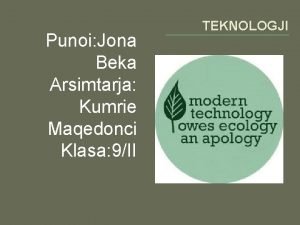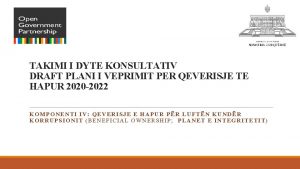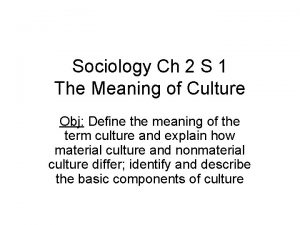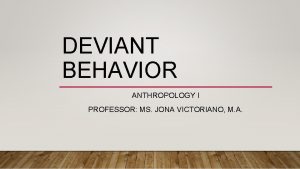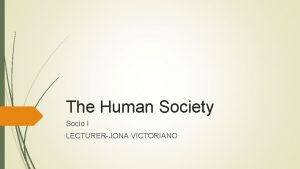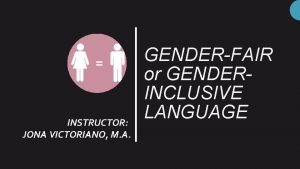CULTURE ANTHROP I PROFESSOR MS JONA VICTORIANO M













- Slides: 13

CULTURE ANTHROP I PROFESSOR: MS. JONA VICTORIANO, M. A.

WHAT IS CULTURE? – “Culture…is that complex whole which include knowledge, belief, arts, morals, law, custom, and any other capabilities and habits acquired by man as a member of society. ” (Tylor, 1871/1958, p. 1)

CHARACTERISTICS OF CULTURE Culture is LEARNED. Culture is ALLENCOMPASSING. Culture is SHARED. Culture is SYMBOLIC. Culture is INTEGRATED. Culture can be ADAPTIVE and MALADAPTIVE.

A. INTERNAL FACTORS Invention Discovery Innovation Colonization Rebellion FACTORS OF CULTURAL CHANGE

B. EXTERNAL FACTORS Diffusion Acculturation Assimilation Amalgamation Enculturation FACTORS OF CULTURAL CHANGE

SYMBOLIC COMPONENTS OF CULTURE – Norms - These refer to the guides of human behaviour that are agreed upon and shared within a culture and that prescribe limits of acceptable behaviour. 1. Folkways (Ex. Pamamanhikan) 2. Mores (Ex. Bigamy, Incest, Cannibalism) 3. Laws (Overspeeding, Tax Evasion, Robbery, Slander, Murder)

– Values – They refer to the standard guidelines of social living by which people assess durability, goodness, and beauty. – Language - It enables humans to organize the world around them into labelled cognitive categories and use these labels to communicate with one another. – Gestures – Ex. Raising an eyebrow, waving of the hand, bowing of the head.

THEORETICAL PARADIGMS IN UNDERSTANDING CULTURE – Structural-Functional Analysis - This theory holds that core values binds members of society together in an integrated system. – Social-Conflict Analysis - This theory argued that the way we deal with the material world (i. e. through Capitalism) powerfully affects all other dimensions of our culture.

THEORETICAL PARADIGMS IN UNDERSTANDING CULTURE – Cultural Materialism - This specific paradigm emphasizes that human culture is significantly shaped by the natural environment.

OTHER PERSPECTIVES ON CULTURE – Ethnocentrism – This is the tendency to apply one’s own cultural values and standards in judging the behaviour and beliefs of people raised in other cultures. – Cultural Relativism – It contends that behaviour in a particular culture should not be judged by the standards of another. – Xenocentrism – It is the preference for the products, styles, or, Ideas of someone else’s culture rather one of one’s own.

ISSUE ABOUT CULTURAL RELATIVISM: THE FGM EXPERIENCE – Road sign near Kapchorwa, Uganda where FGM is outlawed but still practised by the Pokot, Sabiny and Tepeth people.

CULTURE SHOCK 1. Initial Euphoria – one who goes to work in another culture usually begins with great expectations, positive, mind-set, and excitement which usually last from a week to a month. 2. Irritation and Hostility – the focus of attention in this stage is on the differences. This is a stage of catastrophe because the person experienced homesickness, boredom, withdrawal, compulsive eating and drinking, and irritability.

1. Gradual Adjustment – it is a stage when a person begins to orient oneself and able to interpret cultural clues. 2. Adaptation or Biculturalism – this is the stage of full recovery when a person is able to function in two different cultures with confidence.
 Victoriano elementary
Victoriano elementary Demandas de los carrancistas
Demandas de los carrancistas Etapas de la revolución mexicana
Etapas de la revolución mexicana What does the root word anthrop mean
What does the root word anthrop mean Study of word origins
Study of word origins Words with anthrop
Words with anthrop Deskopi
Deskopi Jan jona javoršek
Jan jona javoršek Prorok jona
Prorok jona Dekadni logaritam
Dekadni logaritam Jona karapinjalli
Jona karapinjalli Neelektroliti
Neelektroliti Promotion from associate professor to professor
Promotion from associate professor to professor Sociologists define a symbol as
Sociologists define a symbol as






